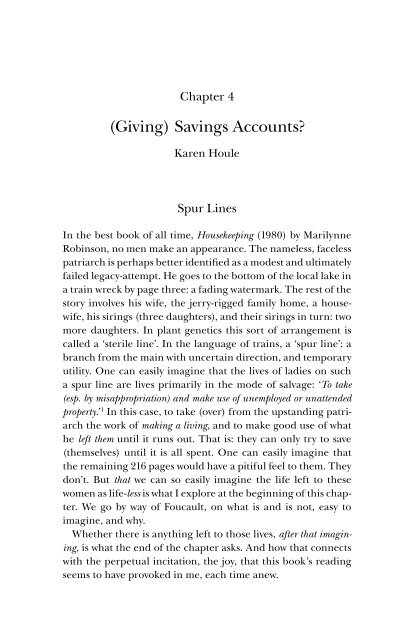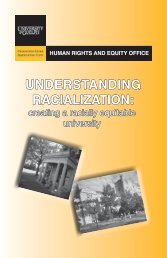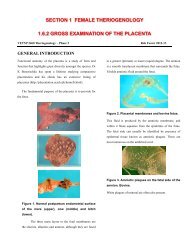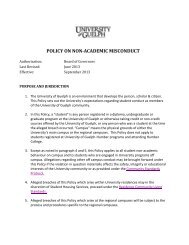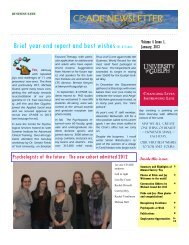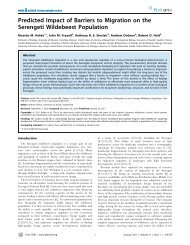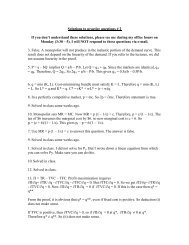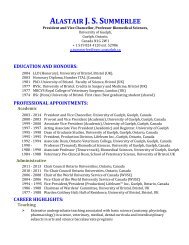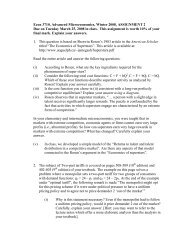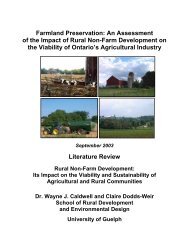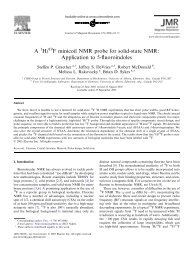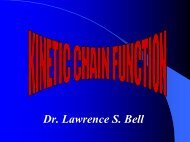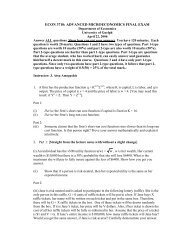(Giving) Savings Accounts? - University of Guelph
(Giving) Savings Accounts? - University of Guelph
(Giving) Savings Accounts? - University of Guelph
Create successful ePaper yourself
Turn your PDF publications into a flip-book with our unique Google optimized e-Paper software.
Chapter 4(<strong>Giving</strong>) <strong>Savings</strong> <strong>Accounts</strong>?Karen HouleSpur LinesIn the best book <strong>of</strong> all time, Housekeeping (1980) by MarilynneRobinson, no men make an appearance. The nameless, facelesspatriarch is perhaps better identified as a modest and ultimatelyfailed legacy-attempt. He goes to the bottom <strong>of</strong> the local lake ina train wreck by page three: a fading watermark. The rest <strong>of</strong> thestory involves his wife, the jerry-rigged family home, a housewife,his sirings (three daughters), and their sirings in turn: twomore daughters. In plant genetics this sort <strong>of</strong> arrangement iscalled a ‘sterile line’. In the language <strong>of</strong> trains, a ‘spur line’: abranch from the main with uncertain direction, and temporaryutility. One can easily imagine that the lives <strong>of</strong> ladies on sucha spur line are lives primarily in the mode <strong>of</strong> salvage: ‘To take(esp. by misappropriation) and make use <strong>of</strong> unemployed or unattendedproperty.’ 1 In this case, to take (over) from the upstanding patriarchthe work <strong>of</strong> making a living, and to make good use <strong>of</strong> whathe left them until it runs out. That is: they can only try to save(themselves) until it is all spent. One can easily imagine thatthe remaining 216 pages would have a pitiful feel to them. Theydon’t. But that we can so easily imagine the life left to thesewomen as life-less is what I explore at the beginning <strong>of</strong> this chapter.We go by way <strong>of</strong> Foucault, on what is and is not, easy toimagine, and why.Whether there is anything left to those lives, after that imagining,is what the end <strong>of</strong> the chapter asks. And how that connectswith the perpetual incitation, the joy, that this book’s readingseems to have provoked in me, each time anew.WHolland_Ch04_FPP.indd 632/5/2009 5:53:55 PM
64 Gilles Deleuze: Image and TextFoucault FlipsOne thing Foucault taught us is that sometimes what we thinkis true is not true. In fact, the exact opposite <strong>of</strong> what we thinkis true, is probably true. After Foucault we get the nauseatingfeeling that we ought to doubt that what we take to be the caseis really the case. We ought to be on high alert. Not for somevague threat lurking in a barbaric corner but right before oureyes. Right under our noses. In a brilliant Cartesian inversion,Foucault suggests that whatever strikes us as clear and distinct,whatever seems indubitable, whatever it is we seem not able todoubt: that is the best place to look for falsehood and deception.In the History <strong>of</strong> Sexuality: Vol. One Foucault took a nearlyindubitable total fact about ‘Victorian England’ – that was themost sexually repressive regime <strong>of</strong> all time, a fact subsequentarchivists and gossips repeated as truth as they investigated andconfirmed the depth and breadth <strong>of</strong> its extraordinary repressivity– and he turned this ‘truth’ on its head(s). He suggestedthat the very opposite might, in fact, be the case: that ‘VictorianEngland’ was perhaps the best example <strong>of</strong> a total and perpetualsexualized fact in the whole history <strong>of</strong> humankind. We can callthese ‘ hypotheses folles’: ‘inversions’.A Nearly Indubitable Total Current FactWhich present truths are so plain as to approach the banal?Which facts <strong>of</strong> the matter so pervasive and common-sensical thatdoubting them borders on lunacy, on the heretical?A cluster <strong>of</strong> truths about virtue, justice, debt, saving (conservation),rates <strong>of</strong> expenditure, distribution and fairness. Theseinclude but are not exhausted by the following: (1) That weare, by nature, acquisitive and possessive individuals; (2) Thatresponsible man, the good citizen, the very best and most desirablekind <strong>of</strong> person is one who saves rather than squanders, ormore precisely, saves judiciously and spends well; (3) That justiceis primarily a matter <strong>of</strong> distribution, and its main challengethus the problem <strong>of</strong> scarcity; (4) That a proper ratio <strong>of</strong> savings toWHolland_Ch04_FPP.indd 642/5/2009 5:53:56 PM
(<strong>Giving</strong>) <strong>Savings</strong> <strong>Accounts</strong>? 65spending, and a proper rate <strong>of</strong> saving (a ‘just savings principle’)to spending, is what justice requires; and is the means <strong>of</strong> progress; 2(5) That it is simply right and good to save for future generations.Libertarians, Communitarians, Utilitarians, Deontologistsand Virtue Ethicists all take these truths to be self-evident. 3They disagree about the details. Their ubiquity and self-evidentnature make these claims excellent candidates for Foucauldianinversion.What if, in fact, the exact opposite were true about the virtues<strong>of</strong> saving for the future? What if, in fact, it was right and goodto spend everything, now, and as quickly as possible? What if,in fact, the happiest and most noble man and country were notthe ones which saved well, or shared well – opening heart andhome, c<strong>of</strong>fers and borders, overflowing honey – to the less fortunate,the weak and the poor? And since, ‘[i]n any age, only alimited number <strong>of</strong> things can be said and seen’ (Bogue, 2004,p. 48), we wonder not only about the correctness or falseness <strong>of</strong>the ‘standard facts’ compared with their challengers, but alsoabout the means by which an alternative hypothesis might evenbe said, and seen? What avenues <strong>of</strong> effective protest and contestation<strong>of</strong> plain truths are even open to us? What would it take forunsayable statements to be heard? What it would take to makevisible the inverted and invisible truths <strong>of</strong> these given ones? Whatcould constitute an effective method to breach the armour <strong>of</strong>this despotic signifying regime?Foucault’s ‘Inversions’ are ComplexThe simple negation <strong>of</strong> a hypothesis – if there were even such a thing –would be a text filled with little-known but crucial facts denouncingthe ubiquitous common-sense ‘facts’, and showing the dominanthypothesis to be untrue. In the case <strong>of</strong> ‘Victorian England’ thatmight be a saucy book with the sexy title: ‘Victorian England wasNot Repressive!’ One possible mode <strong>of</strong> negation <strong>of</strong> a truth, then,is to forward a set <strong>of</strong> opposing facts, counter-evidence.Yet, recall that the ‘inversions’ <strong>of</strong> Foucault were not simplenegations, the mere down-stroke <strong>of</strong> a nay-saying historian!WHolland_Ch04_FPP.indd 652/5/2009 5:53:56 PM
66 Gilles Deleuze: Image and TextFoucault’s ‘inversion’, his method <strong>of</strong> contestation, was more complicated.He contested the content claim <strong>of</strong> a ‘clear and distinct’truth by way <strong>of</strong> the formal features <strong>of</strong> the discourse in which thathypothesis functioned. Foucault’s contestation <strong>of</strong> the fact, thewhat, <strong>of</strong> repressivity <strong>of</strong> ‘Victorian England’ (noncirculation;zones <strong>of</strong> silence; uptight, squashed-downness) involved his demonstratingthe remarkable high degree <strong>of</strong> proliferation, abundanceand lavish expenditure that was ‘Victorian’ discourse.Foucault writes,The central issue, then . . . is not to determine whether onesays yes or no to sex, whether one formulates permissions orprohibitions, whether one asserts its importance or denies itseffects . . . but to account for the fact that it is spoken about . . .What is at issue, briefly, is the over-all ‘discursive-fact’ the wayin which sex is ‘put into discourse’. (Foucault, 1978, p. 11)Foucault modelled how a form <strong>of</strong> discourse can discredit the contentthat discourse pr<strong>of</strong>esses. Since ‘a regime <strong>of</strong> signs constitutesa semiotic system’, and that ‘there is always a form <strong>of</strong> content that issimultaneously inseparable from and independent <strong>of</strong> the form <strong>of</strong> expression’(Deleuze and Guattari, 1987, p. 111), we can assume thatfurther variations <strong>of</strong> discrediting strategies are possible: Thatthe form could credit, and thus compound our faith in a claim.In This is Not A Pipe (1982) Foucault shows how the calligram,or the shape <strong>of</strong> a message, can point to and symbolize that verymessage; or alternately confuse and distract from it. We canalso imagine that other formal features <strong>of</strong> a regime <strong>of</strong> signs – itspositive and negative conceptual personae, its major qualitiesand rhythm-habits, its aftertaste & its affective registers – couldbe involved in the extension and accreditation, or, the counteringand discrediting <strong>of</strong> any hypothesis.In terms <strong>of</strong> the plain truths about justice identified above, theircontestation or affirmation could involve any or all <strong>of</strong> the following:That the language we use to exert a claim to being, bynature, acquisitive and possessive individuals might itself be dispossessiveand nonaccumulative: that while trying to keep thelines <strong>of</strong> transmission <strong>of</strong> a truth true and proper ‘we participate’,WHolland_Ch04_FPP.indd 662/5/2009 5:53:56 PM
(<strong>Giving</strong>) <strong>Savings</strong> <strong>Accounts</strong>? 67to use a lovely phrase <strong>of</strong> Judith Butler’s, ‘in a certain wild future<strong>of</strong> [its] inheritance’ (Butler, 2005, p. 32). That the man whoespouses ‘the good man saves judiciously and spends well’ mighthimself, in the act <strong>of</strong> espousing, spend very badly, taking hissweet time to tell us about giving. That tome upon tome claimingthat justice is primarily a matter <strong>of</strong> distribution belie howjustice is as much matter <strong>of</strong> the sheer weight <strong>of</strong> words, <strong>of</strong> forcepinning a possible asset or resource or tale, in one place. Thatall this talk about the problem <strong>of</strong> scarcity really means the problemis overproduction. And that the widely circulating dictum:‘it is right and good to save for future generations’ is an insidiousmode by which lavish spending happens now and saving isever postponed. Justice discourse, like the discourse <strong>of</strong> pleasure,is a proliferative and spending modality. Bataille suspected thatwe create in order to expend, and that if we retain things wehave produced it is only to allow ourselves to continue living,and thus destroying. What Foucault, Deleuze and Guattari addto Bataille’s inverted insight are the many ways that signifyingpractices constitute the conditions for creation, continuity anddestruction <strong>of</strong> everyday truths.Cleaning House?In this chapter, I originally set out to write about the novelHousekeeping and why it was a contestation <strong>of</strong>, or at least animpressive struggle with, those plain everyday truths about savingsand spendings, especially about the roles <strong>of</strong> men and womenin salvation pumps, worldly and other-worldly. Housekeepingseemed an exemplar <strong>of</strong> the aneconomic, or perhaps even thegeneral or ‘feminine economy’. I thought the main character,Sylvie, was perhaps a new figure for ‘the nomad’, albeit a feminineone, a female Bartleby with a kid to prefer not to mind. Iwanted to give that lesson. I read Housekeeping as an allegory fora certain set <strong>of</strong> expectations incumbent upon persons if they areto count as persons, and to not end in nothing, as the centralfigure, Sylvie, seems to. Those expectations are <strong>of</strong>fspring <strong>of</strong> theplain everyday truths I’ve been discussing here. The progressiveWHolland_Ch04_FPP.indd 672/5/2009 5:53:56 PM
68 Gilles Deleuze: Image and Textappropriateness <strong>of</strong>: indulgence in sentiment; <strong>of</strong> hoarding andshining; <strong>of</strong> taking on the work <strong>of</strong> working; <strong>of</strong> private ownershipand passing on things in ‘good condition’; <strong>of</strong> making childrenand passing them on, and things on to them, in good condition;<strong>of</strong> caring about status; <strong>of</strong> taking pleasure in appearance;the pleasure <strong>of</strong> heritability; the necessity <strong>of</strong> investment and thepromise <strong>of</strong> redemption. In short: <strong>of</strong> saving and being saved.Sylvie chooses to occupy her life otherwise: in silence (sheis silent most <strong>of</strong> the time, there’s no ‘idle chatter’), in impulse(she eats cake when she wants and gives it to the children she‘mothers’ for breakfast), in enjoying ruin (she goes regularly toa caved in house in the hills), even in cultivating a measure <strong>of</strong>ruination and disruption. She lacks an interest and aptitude inthe required attribute <strong>of</strong> thrift,The parlor was full <strong>of</strong> newspapers and magazines. They werestacked neatly. Nevertheless they took up the end <strong>of</strong> the roomwhere the fireplace had been. Then there were the cansstacked along the wall opposite the couch. Like the newspapers,they were stacked to the ceiling. Nevertheless, theytook up considerable floor space . . . Sylvie kept them, I think,because she considered accumulation to be the essence <strong>of</strong>housekeeping, and because she considered the hoarding<strong>of</strong> worthless things to be pro<strong>of</strong> <strong>of</strong> a particularly scrupulousthrift. (Housekeeping, p. 180)Sylvie is what Kristeva calls, ‘the woman-non-mother . . . thesister’ (1969, 314). Spurning men, investment, repairs, having‘her own’ children, the accumulation <strong>of</strong> valuable things, a concernfor the future, not only does Sylvie not extend into thefuture in some form <strong>of</strong> herself to reap what she sows, she endsup without even a present, a now, to inhere in. In return for herchoosings, Sylvie isn’t ‘allowed’ to ‘keep’ the shelter <strong>of</strong> the familyhome she was born in, and is the only living heir to. Nor isshe allowed to ‘keep’ the shelter <strong>of</strong> the love she cultivates, deliberatelyand with skill, in the child, Ruthie. By the end <strong>of</strong> thisstory, the ‘family home’ is ruined. The Despot, vanished. Sondid not appear, dwell or return. The Mothers have all suicidedWHolland_Ch04_FPP.indd 682/5/2009 5:53:56 PM
(<strong>Giving</strong>) <strong>Savings</strong> <strong>Accounts</strong>? 69and abdicated. Daughters teetered in the absence <strong>of</strong> femininedress-rehearsals, ruined.We can too well imagine that such a story could not endhappily.For Sylvie, utterly failing to take up any <strong>of</strong> the available personae– Father, Mother, Son or Daughter – is levelled by the veryform <strong>of</strong> judgement itself. Ruthie, the narrator, turns to ask us,the readers toImagine the blank light <strong>of</strong> Judgment falling on you suddenly.It would be like that. For even things lost in a house abide . . .and many household things are <strong>of</strong> purely sentimental value, like thedim coil <strong>of</strong> thick hair, saved from my grandmother’s girlhood,which was kept in a hatbox on top <strong>of</strong> the wardrobe, along withmy mother’s grey purse. In the equal light <strong>of</strong> disinterestedscrutiny such things are not themselves. They are transformedinto pure object, and are horrible, and must be burned. (209)And here, now, when we think we’ve learned all possible lessonsHousekeeping has to give us – when we are spent – we fall into theRabbit Hole.‘A More Devious and Discreet Form <strong>of</strong> Power’Saying that Foucault put us on high alert vastly understates thesituation. For we haven’t yet thought about the ways that authorsand readers <strong>of</strong> texts (including me and you, and Housekeeping,and A Thousand Plateaus) are chief, if blind, participants ininversions. More damning: prime enjoyers <strong>of</strong> precisely what itdenies, and by virtue <strong>of</strong> that denial.For it is not enough to ask how sex is ‘put into discourse’?Foucault showed us, in the first instance, that forms <strong>of</strong> proliferationcontradict the hypothesis <strong>of</strong> repressivity. This requiredthat we equate proliferation itself with ‘sex’, with pleasure. Amore excruciating question is how sex (expenditure, proliferation)is continuously put into a discourse which manages tocontinuously disavow it? For Foucault showed us, in the secondWHolland_Ch04_FPP.indd 692/5/2009 5:53:56 PM
70 Gilles Deleuze: Image and Textinstance, and using his own work as exemplar, that this ‘proliferation’was not merely the dry pleasure <strong>of</strong> endless textualhumping. There were distinct extra pleasures available to thearchivist, to the writer and the readers <strong>of</strong> the repressive hypothesis,by virtue <strong>of</strong> its proliferation under repression: The pleasures <strong>of</strong>talking while claiming talking cannot happen, the pleasures <strong>of</strong>talking about what one cannot talk about, the pleasures <strong>of</strong> gettingaway with what one is denouncing, the pleasures <strong>of</strong> givingand taking what is not one’s to give, the pleasures <strong>of</strong> making theabsent present, the pleasures <strong>of</strong> perpetual incitement and energeticsustained intercourse with multiple, unidentifiable (albeitbookish) partners.Foucault’s sick genius was to solder these pleasures to theirrepression, a repression confirmed by reiterating, by confirmingas true the content <strong>of</strong> the original hypothesis. AboutVictorian repressivity, Foucault wrote, ‘What is interesting isnot whether we are repressed or not, and in which ways, butthat we keep saying over and over, in a million ways, and incessantly,that we are.’ An impossibly complex mechanism carriesand circulates the opposite <strong>of</strong> what it avows; is able to perpetuallyforward what it disavows, and these counter-truths proliferateto the extent that they are successfully hidden from purview.The complex structures and forces (the kinesis, the dynamis,the topologies) <strong>of</strong> regimes <strong>of</strong> signs means that, even in our socalledinformed and critical postures (analysis, contestation,debate, conceptual clarification) we constitute something likethe fabric and supply the force <strong>of</strong> what cannot be noticed, cannotbe called into question. Thus Foucault’s work commandsthat we backbend any <strong>of</strong> our common-sense hypotheses <strong>of</strong>feredin or as texts, towards the features <strong>of</strong> ourselves which produce andextend the selective grounds <strong>of</strong> our inquiry in the first place: toquestion the very things we aren’t capable <strong>of</strong> calling into question,and then to question that. In the case <strong>of</strong> the widely circulatingtruth <strong>of</strong> the ‘Victorian repressive hypothesis’, Foucaultcharges us, and himself, with participating in and enjoyingexcruciating forms <strong>of</strong> discredited pleasures. All that talk, allthose PowerPoints about a lack <strong>of</strong> pleasure enables pleasure toWHolland_Ch04_FPP.indd 702/5/2009 5:53:56 PM
(<strong>Giving</strong>) <strong>Savings</strong> <strong>Accounts</strong>? 71happen – a lot – but also, crucially, plasters over that pleasantcounterfact.Foucault has put us on extreme and impossible alert. For, weare not merely to imagine that the basic facts we take to be trueare possibly false, nor simply that the structures <strong>of</strong> discourses cancontradict or further the claims a discourse makes, but to tryto imagine, even try to deceive ourselves into imagining that we areinextricably involved in the production and proliferation <strong>of</strong>everyday truths via forms and modes <strong>of</strong> production (imaginingsand material) and proliferation which enable us to participatein and to enjoy as true and good the very things we denounce asfalse and vile.Without our knowledgeTo put this in terms that could apply to any ‘discursive regime’:The what <strong>of</strong> a particular plain truth is confirmed via a feature <strong>of</strong>the how <strong>of</strong> its truth-making, but that complex how also performativelycontradicts the content <strong>of</strong> the what claim. Moreover, thatcontradiction itself enables, for some, a kind <strong>of</strong> invisibilized,perpetual, perpetuate-ed enjoyment <strong>of</strong> its very counter-truth, ahidden and silent and protracted enjoyment and pay-<strong>of</strong>f.To put this in terms <strong>of</strong> the despotic regime <strong>of</strong> saving-asjustice,we have to try to ask just exactly how ‘justice as saving’ isput into a discourse which manages to perpetually dispute thatvery claim? And, what is our complex involvement in the disputationand advancement those claims and their formal inversions?What do we get to suffer and enjoy? To paraphrase: Whatis interesting is not whether we are not saving enough or not, and inwhich ways, but that we keep saying, over and over, in a million ways,and incessantly, that we must.Suddenly these two discursive regimes – the regime <strong>of</strong> pleasureand the regime <strong>of</strong> saving/spending/justice – crossover ontoone another. Not only is all discourse – even protestation – akind <strong>of</strong> spending, wasting, delaying indulgence; but engagingin any discourse is a sure means <strong>of</strong> accreditation (even forinstance, avowing the ‘gift economy’). But also, the structuralWHolland_Ch04_FPP.indd 712/5/2009 5:53:56 PM
72 Gilles Deleuze: Image and Text‘performance’ – the proliferation and wild spending whichis discourse – ins<strong>of</strong>ar as it contradicts the overt lessons aboutkeeping the measure, about deferring spending, about beingaccountable, must itself be a kind <strong>of</strong> silent hydraulics and gradients,indeed a structure <strong>of</strong> perpetual dissimulating deferral whichextracts and pays, handsomely. Especially judgement.Deleuze and Guattari assessed the intolerable wrack <strong>of</strong> the‘doctrine <strong>of</strong> judgment’ which lies at the heart <strong>of</strong> the very burdenthat saving and spending well promise to mitigate and throw<strong>of</strong>f. The origin <strong>of</strong> debt, perpetual origin, requires a debt: thatit is infinite and thus unpayable. The infinite and endless debtrequires an infinite and endlessly indebted debtor – hence thenecessity <strong>of</strong> the doctrine <strong>of</strong> the soul’s immortality. ‘ “The debtormust survive if his debt is to be infinite.” The debtor’s debt cannever be discharged and in this sense judgment, as final judgment(or Last Judgment) is perpetually deferred. Judging, then,as an endless and forever uncompleted process, is directly relatedto deferral: “it is the act <strong>of</strong> deferring, <strong>of</strong> carrying to infinity, thatmakes judgment possible”. . . . Deferral is the act . . . [which]takes place within an order <strong>of</strong> time, an infinite straight line <strong>of</strong>moments extending toward a perpetually receding end point.Judgment, then, does not create but instead presupposes thisrelation between existence and infinity and this order <strong>of</strong> time:“to anyone who stands in this relation is given the power to judgeand be judged” ’ (Bogue, p. 157–8; emphasis added).What Bogue and Deleuze are suggesting here is that what we‘get’, what we recuperate without fail, from advocating or protestingthat set <strong>of</strong> basic beliefs about justice – as I was attemptingwhen I enumerated the lessons Sylvie gives us – is a self itself andits time. Both advocating and protesting require and mobilizethe despotic resonating operation <strong>of</strong> judgement. That relation,just like the pleasure Foucault showed is the form <strong>of</strong> relationalityitself, can not be contradicted, nor discredited, nor resisted.Nor can we be freed from it: not by any negating content claimand not by any formal claim, since no form <strong>of</strong> formal claims canever do anything but extend a discourse and keep its shape. Sylviedid not stand in this relation, and hence was a being with onlythe power to be judged.WHolland_Ch04_FPP.indd 722/5/2009 5:53:57 PM
(<strong>Giving</strong>) <strong>Savings</strong> <strong>Accounts</strong>? 73On the Passional Regime, andNot Being Able to Confirm ItClearly, I have hamstrung myself. Whatever I might still wantto say about how Sylvie, and becoming-woman (and hence I)might manage to escape, to flee, the dual clutches <strong>of</strong> salvationand judgement, to break into the passional, post-signifyingregime, will, without fail involve a measure, a whiff, <strong>of</strong> that veryjudgement and salvation. That might be the way all stories end.But can we not even imagine we might try to find fault – thatthis rupture can be in complicity with the law, or, rather that it canconstitute a point <strong>of</strong> departure for even deeper changes? (Kristeva,1974, p. 494). Where, if anywhere, in such a totalizing signifyingfield as this are there genuine escape holes and not just nausea-inducingreturn-hatches? 4 How could we engage in healthy,untimely disavowals, dispossessions and deterritorializationswithout thereby opening a lucrative Swiss bank account in theunconscious, in the academia, or in the press? What conceptualpersonae, if any, might we adopt or laud as revolutionary whowill not merely turn out to be members <strong>of</strong> the Righteous Familyvon Trappe, even if an unpopular one? What kinds <strong>of</strong> critical,signifying practices – shapes, after tastes, affective registers – inthe very question <strong>of</strong> saving and spending will ‘not to help us getour bearings or to find ourselves, but to lose our bearings andour “selves”, to get lost’ (Baugh, 2006, p. 224)? To lose track. Tonot count. To not <strong>of</strong>fer (us) something to count on.Yet, something still palpably live-able. Each time anew. Adescription <strong>of</strong> Sylvie?Sylvie as Non-Relation: Dis-lodged?There are ur-features <strong>of</strong> the life that is Sylvie which sketchaffirmation without recuperation, motion without coming andgoing, living without having saved up for it, viability withoutform. Sylvie thrives without plan. The relations that she inhabits,without compulsion (hence violence), without creating (henceowning or sharing), and without destroying (hence guilt) areWHolland_Ch04_FPP.indd 732/5/2009 5:53:57 PM
74 Gilles Deleuze: Image and Textwhat we could call, for the time being, ‘non-relationing’. Here aretwo sketches <strong>of</strong> these:a. Other thrivings thriveEarly in the book a sick worry comes upon the abandoned youngsisters (Ruthie and Lucille) after an incident in which the limitedresources <strong>of</strong> the elder aunt-made-surrogate-parents becomepainfully obvious: The girls, playing on the newly flooded andfrozen lake way after darkness falls get home ‘lethally chilled’,and the non-mobile aunts are in a fright which could ‘not reallybe mollified’. ‘Granting that this and even subsequent winters mightspare us, there were still the perils <strong>of</strong> adolescence, <strong>of</strong> marriage, <strong>of</strong> childbirth,all formidable in themselves, but how many times compoundedby our strange history?’ (36). Yet, the girl children do grow intoyoung women, and not exactly fail to thrive, but fail to thrive ina very particular fashion: as would-be wifely types. Their finalsurrogate mother and father, Sylvie, propped up at the elbowsby local church women bent on her salvation, fails also to thrivein the same fashion as motherly or fatherly type. Sylvie knows thatshe ought to make progress on the house, on her own femaleappearance, on her prospects, and above all, on the prospects<strong>of</strong> her ‘children’ and their lives (present and future), but shehas neither the proper habits (she prefers to eat in the quiet inthe dark, she wears her shoes to bed), nor the fully functionalinclination, nor the means to muster an appropriate level <strong>of</strong>accumulation (<strong>of</strong> things <strong>of</strong> use, <strong>of</strong> learning, or discipline or <strong>of</strong>godliness) required to be a socially viable candidate for the position<strong>of</strong> mother or father, and then grandmother, and on inhallowed memory. It is not that she is reticent and needs encouragement,nor correct to say that she is ignorant and needs tutoring.She is very intelligent, and curious, and joyful, and adept:just not at the ‘right’ times and in the ‘right’ ways. It is that shehas not developed the proper set <strong>of</strong> inclinations, nor does shewant to anymore, if she ever did. The girls skip school to play onthe lake and follow paths into the woods. At first Sylvie simplydoesn’t know. When she first finds out, she tries to argue themto a return to normal, and writes notes to the teacher, tryingWHolland_Ch04_FPP.indd 742/5/2009 5:53:57 PM
(<strong>Giving</strong>) <strong>Savings</strong> <strong>Accounts</strong>? 75to come up with explanations. Ultimately she herself takes thegirls out during the day to her own secret hiding places in thewoods. The girls are able to resettle themselves around thisother queer life she fashions: one girl (Ruth) is content, dare Isay happy. Lucille slides away towards a less queer life with normalgirls from the drugstore and another surrogate mom, theMusic teacher, who teaches her to do her hair and sew a dress.b. Life but no ‘journey’Sylvie’s initial journey outward from her girlhood and her girlhoodhome can in no way be described as a questfull odyssey towardswisdom or meaningful gain. Early in the novel she is describedas putting on her mother’s gloves one day on the spur <strong>of</strong> the momentand heading out to visit her older sister in Seattle. Perhaps shearrived there, perhaps she did not. The two old aunts wishing tosummon Sylvie to replace them in the role <strong>of</strong> guardian write tothe address on the single, pleasant note she had ever sent home.Sylvie ducks back into the novel, abruptly, in a plain beige overcoat,and with nothing in her pockets but her reddened hands. She ismet at the door by the fact that, ‘grandmother’s will did not mentionSylvie. Her provisions for us did not include her in any way’ (41). Herreturn is in no way a prodigal moment, an arc-y telos. She doesnot personify ‘Spirit discover[ing] that the truth it sought outsideitself is in fact its entire historical development, comprehendedsystematically as a series <strong>of</strong> conceptually related stages that bothnegate and complement each other . . . accomplish[ing] a “returnto itself”. . . . Spirit’s odyssey toward truth is in truth a homecoming,a reconciliation with itself.’ (Baugh, 2003, p. 2) Sylvie couldnot be said to return to her girlhood home, to her family, to herhometown anymore than she could have been said to have fled it.She did not go, with rocks in her pockets, like wilful Woolf, makingsadness drown out life’s efforts. Sylvie is simply in motion,almost untrackable. Spur.Sylvie and the last girl, the last <strong>of</strong> the family line, just leave inthe night. First they set fire to the house. Or was it an accident,the quasi-cause <strong>of</strong> the lit match causing ‘effects ever beyondintentions’? (Levinas, 1998, p. 3). They walk all the way acrossWHolland_Ch04_FPP.indd 752/5/2009 5:53:57 PM
76 Gilles Deleuze: Image and Texta dangerous rail bridge over the lake, and jump freight in themorning, with nothing salvaged, nothing in their pockets.In the end nothing comes <strong>of</strong> it all. Housekeeping is, or has, an endingwithout an ending.When the Homing Instinct Fails:‘Higher than all Reconciliation’?In Housekeeping, the family home, the family, and the entire contents<strong>of</strong> their lives rotate away from one set <strong>of</strong> relations (‘proprietary,property, proper’) towards something else entirely, someother form <strong>of</strong> life, the significance <strong>of</strong> which the novel, and thischapter are an effort to gesture towards. It is a form <strong>of</strong> life, notwithout meaning, or affect. Sylvie is the pivot for an asymptoticflight from ‘proprietary, property, proper’ and from the futuralitythat such forms <strong>of</strong> belonging entail. This pivoting involves anunarticulable set <strong>of</strong> moves and relations, and yet the character orexpression <strong>of</strong> that difference is distinctly feminine and joyous.What is pr<strong>of</strong>ound about Housekeeping is two-fold. First, it bearswitness to the possibility that there are alternatives to the dominantpattern and habits called ‘human life’ <strong>of</strong> which the self evidenttruths about justice I listed form the spine. We hear that ‘theyears between her husband’s death and her eldest daughter’sleaving home were, in fact, years <strong>of</strong> almost perfect serenity. Mygrandfather had sometimes spoken <strong>of</strong> disappointment. Withhim gone they were cut free from the troublesome possibility <strong>of</strong>success, recognition, advancement. They had no reason to lookforward, nothing to regret’ (13). Second, it does not set up asalternative a nihilistic rant or suicidal cave-in. It is ‘somethingelse entirely’, revealed to us about, but not in, our own lives, atmoments when the common-sense that props us up is underimmense strain. As when Henry Perowne, protagonist <strong>of</strong> IanMcEwan’s Saturday is sorting his mother’s things.As the shelves and drawers emptied, and the boxes and bagsfilled, he saw that no one owned anything, really. It’s allrented, or borrowed. (1995, p. 274)WHolland_Ch04_FPP.indd 762/5/2009 5:53:57 PM
(<strong>Giving</strong>) <strong>Savings</strong> <strong>Accounts</strong>? 77The life glimpsed and gestured in Housekeeping is not unhappy,not unjust, not unloving, not empty <strong>of</strong> beauty, not senseless, nordoes it lack logic. It lacks a particular kind <strong>of</strong> logic. What’s more:that we can be moved by it; that we can imagine it, that we canborrow that thought without debt – suggests that the so-calledunthinkable alternative to what is, is not so much a lesson aswhat we should try to not lose sight <strong>of</strong>. Without counting on it.Notes1Oxford English Dictionary.2Rawls imagines a ‘last stage <strong>of</strong> society in which justice is achieved andindefinitely maintained, the goal for the sake <strong>of</strong> which saving wasrequired’ (Paden, 1997, p. 4).3Hindus, Buddhists, Muslims, Christians too, hold a closely related set<strong>of</strong> ‘truths’, though not expressed in secular terms: debt to a creator,saving oneself, salvation in an afterlife, bad karma, heaven, filialpiety, acquiring sin and discharging it in confessional modes, reapingwhat one sows. Just like the set <strong>of</strong> premises found in the ‘secularpolitical’ these rely on a cluster <strong>of</strong> concepts based in the ‘closed economic’:measure, distribution, exchange, commerce, trafficking.4Nausea-traps such as one discovers, crawling on all fours, in GregorSchneider’s 2001 Venice Biennale Ur-house installation (http://www.designboom.com/snapshots/venezia/germany.html).Works CitedBaugh, B. French Hegel: From Surrealism to Postmodernism (New York:Routledge, 2003).—‘Let’s Get Lost: From the Death <strong>of</strong> the Author to the Disappearance<strong>of</strong> the Reader’, Symposium, 10, 1 (2006), pp. 223–32.Bogue, R. Deleuze’s Wake: Tributes and Tributaries (Albany, NY: SUNYPress, 2004).Butler, J. ‘On Never Having Learned How to Live’. Differences, 16, 3(2005), pp. 27–34.Deleuze, G. and F. Guattari. A Thousand Plateaus: Capitalism andSchizophrenia, trans. B. Massumi (Minneapolis: <strong>University</strong> <strong>of</strong>Minnesota Press, 1987).Foucault, M. History <strong>of</strong> Sexuality: Volume One, trans. R. Hurley (NewYork: Vintage Books, 1978).WHolland_Ch04_FPP.indd 772/5/2009 5:53:57 PM
78 Gilles Deleuze: Image and TextFoucault, M. This is Not a Pipe, trans. J. Harkness (Berkeley: <strong>University</strong><strong>of</strong> California Press, 1982).Kristeva, J. La Revolution du langage poetique (Paris: Edition du Seuil,1974).—Semiotike: Recherche pour une semanalyse (Paris: Edition du Seuil,1969).Levinas, E. Entre-Nous, trans. M. B. Smith and B. Harshav (New York:Columbia <strong>University</strong> Press, 1998).McEwan, I. Saturday (Toronto: Knopf, 1995).Paden, R. ‘Rawls’ Just <strong>Savings</strong> Principle and the Sense <strong>of</strong> Justice’, SocialTheory and Practice, 23, 1 (1997), pp. 27–52.Robinson, M. Housekeeping (New York and Toronto: Bantam Books,1980).WHolland_Ch04_FPP.indd 782/5/2009 5:53:57 PM


